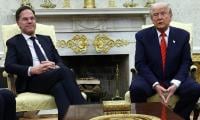With nearly two years in power, the Biden Administration shows no sign of changing America’s confrontational posture towards China. Even though all eyes were set on a policy of engagement, intense competition between the two arch rivals has ended up increasing points of friction.
Trade sanctions, technology war, export control, decoupling, and rupturing supply chains underscore the tense China-US relations that severely undermine the global economy and upend the norms of international trade.
Biden’s main concern, like his predecessor Trump, is cyber security, national security and protecting the US economy by maintaining American supremacy vis-a-vis the dominant position of an assertive China. Biden has taken several coercive measures; he continues to raise tariff walls on trade, sanction Chinese officials, impose visa restrictions for Chinese students and ban imports from Xinjiang.
He has virtually declared a technology war on China. His stringent curbs on tech exports are intended to prohibit Chinese companies from procuring advanced semiconductors from the US, and anywhere in the world made with American expertise. He has blacklisted a number of Chinese tech companies, including Huawei, on grounds of national security.
Biden signed the Chips and Science Act last year, which includes $52 billion in incentives and subsidies to boost semiconductor manufacturing in the US, and the US Innovation and Competition Act 2021 to increase domestic funding for the sensitive technology. The aim is to thwart China’s technological development that could bolster its capabilities in the military and cyber spheres.
The US is seeking allies to wage this war, and is looking at Japan, South Korea, Taiwan and Singapore. But these Asian countries are reluctant partners because they have deep economic relations with China, and they do not want to fracture them. About 60 per cent of chips made in Taiwan are sold to China; Japan exports almost one-third of its total chips to China. But both countries rely heavily on American companies for business and on the US which acts as a guarantor of security in the Indo-Pacific region, which is why they may have little choice but to comply with America’s export control regime and cut sales of advanced chips to China.
Optimists suggest that the complete decoupling of supply chains in tech trade between Chinese and American spheres may not be realistic, given the fact that both are economically interdependent; a majority of iPhones are still produced in China.
The major flashpoint in China-US tensions occurred with Speaker of the US House of Representative Nancy Pelosi’s Taiwan visit last August. The visit was seen as America’s solid support to ‘democratic’ Taiwan in the face of ‘autocratic’ China. China denounced US action and regarded the visit as a major provocation and ‘crossing the red line’. It reacted assertively by waging formidable military drills, including firing conventional missiles around Taiwan, which it considers its own territory.
The US considers China as its ‘biggest geopolitical challenge’, which has the capacity to “tilt the global playing field to its benefit”. China has responded to US criticism of its statecraft by turning to ‘wolf warrior’ diplomacy — use of assertive language and actions to safeguard China’s interests and damage America’s image. This type of competition between two powerful countries resembles the pattern of the cold-war competition between the US and the erstwhile Soviet Union in shaming adversaries by drawing attention to their abuses. Another way of competing is outbidding each other and bestowing economic benefits to countries to win them over.
For instance, China has exerted great influence in the South Pacific in areas of maritime, cyber security and economic development by drawing countries close to Beijing’s orbit. To counter China’s moves, the US and its allies including Australia, Japan, New Zealand and the UK has launched a scheme called Partners in the Blue Pacific, which aims to help small countries in the region tackle issues from climate change to illegal fishing and from providing vaccines to creating educational opportunities. These initiatives are an attempt to nullify China’s increasing influence in the region and arrest the declining US presence.
As a countermeasure to China’s Belt and Road Initiative — which is a multitrillion-dollar infrastructure and investment project that has encouraged global trade and industrial activities in Greece, Pakistan, Kenya, Sri Lanka, Africa, Latin America and elsewhere – the US along with the G-7 countries has established the Partnership for Global Infrastructure and Investment. It plans to offer $200 billion to finance global infrastructure projects in developing countries. The fierce competition between the rival hierarchies has contributed to squeeze benefits by the smaller countries.
Not only do the US and China compete, they also cooperate with other countries when face shared risk. And this brings rewards for smaller countries. In the last climate conference (COP27), developed countries announced a climate compensation fund for poor countries, channelling billions of dollars into developing green technology at home and financing it abroad. This will reduce the cost of green technology by integrating supply chains and allowing path for progress.
In the backdrop of a global recession, the pandemic outbreak, and the ongoing Ukraine war, it is important to prevent competition from drifting into conflict and find ways to work together on urgent global issues. Whether or not the last Xi-Biden meeting that happened at the G-20 summit in Bali, Indonesia, in November last year will stabilize the perilous ties is yet to be seen.
There is a tacit understanding that managing China-US relations responsibly has far-reaching consequences for the global economy, international peace and security, and world trade.
The writer holds an LLM degree in international economic law from the University of Warwick. She can be reached at: beelam_ramzan@yahoo.com
People of that time believed that an eclipse was a symbol of displeasure of gods
Vertically speaking, dominance of domestic debt in Pakistan’s debt portfolio is haunting
Loss of biodiversity is stark reminder that urban mismanagement is not just infrastructural failure but ecological...
Strong public warning systems can also help ensure quick evacuations in places prone to fires
PPPs in Pakistan's WASH sector face significant regulatory and policy challenges that hinder their effectiveness
Instead, it would have powerful chairman with three-year term, appointed at prime minister’s discretion







